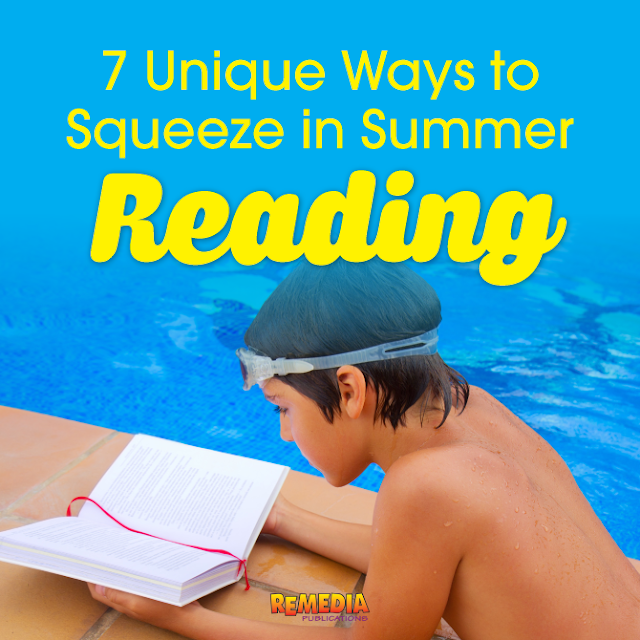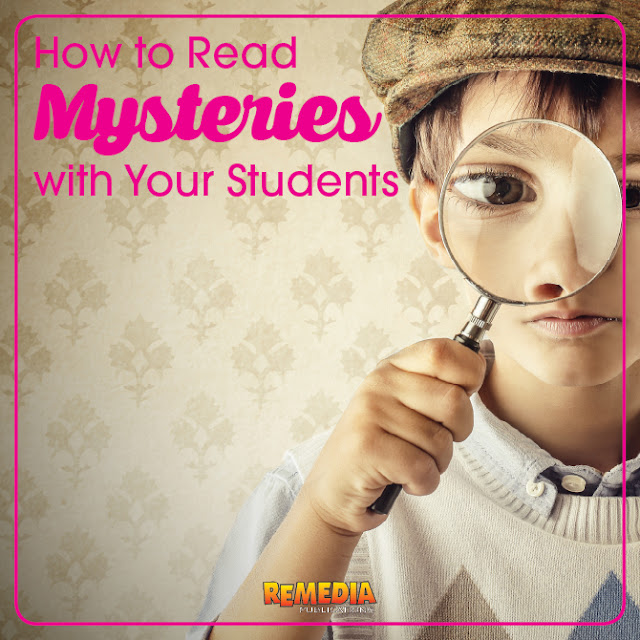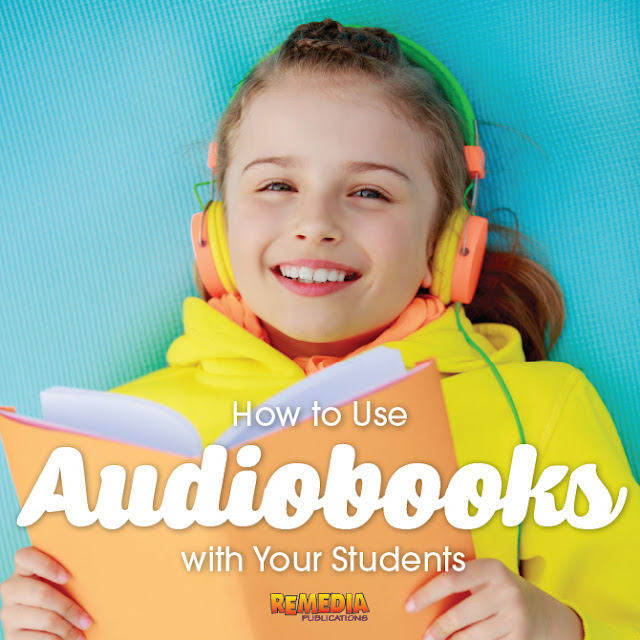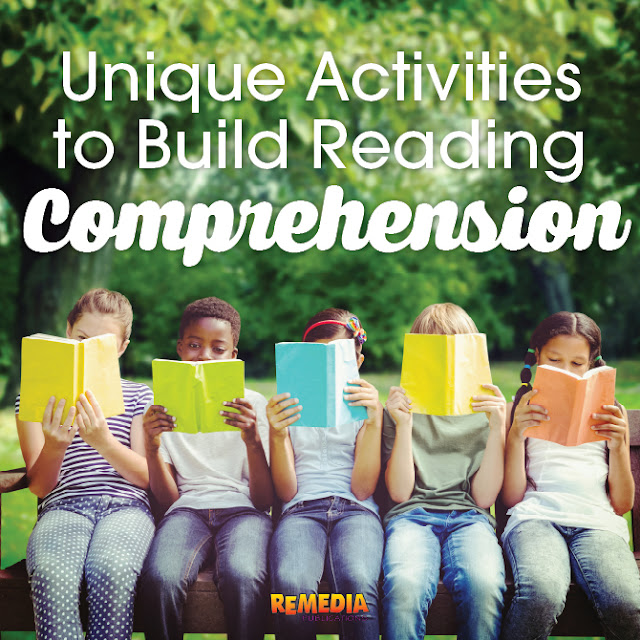Whether you have a non-reading teenager or a fourth-grader who is reading below grade level, it is key to grab your students’attention and hold it in order to motivate and teach them.
Start by determining your struggling readers’ interests. This is key! Knowing what will get each of your students’ attention will help you teach so many new things! Is it music, cars, animals, sports, mysteries, zombies, or surfing? Nail that down and incorporate these four activities to help build your struggling readers’ skills.
Showing posts with label reading. Show all posts
Showing posts with label reading. Show all posts
Build these 3 Key Skills by Using Audiobooks
As you know, audiobooks are a great tool for helping your struggling readers with fluency. But there are so many other ways you can use audiobooks in the classroom! Read-along audiobooks are just another unique way to help engage your students to help improve their comprehension, listening, and thinking skills!
Unique Ways to Squeeze in Summer Reading
Some students just don't love reading. The idea of sitting down to read for 5 or 10 minutes (let alone 30) can seem daunting to some students. How on earth can you motivate struggling and reluctant readers to read the necessary 20 minutes a day over the summer? Try these unique activities, tips, and games that will help you squeeze in summer reading without making your kiddos feel like they are sitting down to read a chapter book–don't worry, you'll work up to that!
5 Reasons to Use Cloze Reading
Cloze reading is a wonderful springboard for comprehension. When students complete a cloze passage and have the opportunity to discuss their responses, more significant growth in comprehension takes place. Students not only gain a greater understanding of the concepts introduced in the text, but they improve and expand multiple skills. These skills are five undeniable reasons why you should use cloze reading with your students.
5 Mysteries Students Should Read
Here at Remedia, we love a good mystery! We’ve found that the mystery genre is a great way to engage students in reading, build comprehension skills, and improve critical thinking. That’s why we’ve put together this four-part series all about the wonderful genre of MYSTERIES!
Sherlock Holmes
Sherlock Holmes is typically more appropriate for grade 8, so if that is where your student’s reading level is, then terrific! If not, your students reading at a grade 5 will appreciate our High-Interest/Low Readability Classic adaptation of TheAdventures of Sherlock Holmes and The Hound of Baskervilles. These activity books break the mysteries into 10 chapters that include follow-up comprehension questions and vocabulary-building activities. Plus, you can pair the activity book with an audio CD, which features a word-for-word reading and exciting sound effects.
Nancy Drew
In 1993, the New York Times called Nancy Drew a “30s sleuth and a 90s role-model.” And we think that over twenty years later, this still holds true. Especially since the publisher continues to update and modernize Nancy Drew’s stories. Follow this link for a list of titles and their reading and interest levels.
PART 4: 5 Mysteries Students Should Read
Sherlock Holmes
Sherlock Holmes is typically more appropriate for grade 8, so if that is where your student’s reading level is, then terrific! If not, your students reading at a grade 5 will appreciate our High-Interest/Low Readability Classic adaptation of TheAdventures of Sherlock Holmes and The Hound of Baskervilles. These activity books break the mysteries into 10 chapters that include follow-up comprehension questions and vocabulary-building activities. Plus, you can pair the activity book with an audio CD, which features a word-for-word reading and exciting sound effects.
Nancy Drew
In 1993, the New York Times called Nancy Drew a “30s sleuth and a 90s role-model.” And we think that over twenty years later, this still holds true. Especially since the publisher continues to update and modernize Nancy Drew’s stories. Follow this link for a list of titles and their reading and interest levels.
Activities for After You’ve Read a Mystery
Here at Remedia, we love a good mystery! We’ve found that the mystery genre is a great way to engage students in reading, build comprehension skills, and improve critical thinking. That’s why we’ve put together this four-part series all about the wonderful genre of MYSTERIES!
Wanted Sign
Have students create a wanted sign for the villain of their whodunit. Students can draw the bad guy and then beneath the picture write who, what, where, when, why about the criminal.
Follow the Clues
As students read, have students write down the clues and the paragraph or page number they are found on. Then, once students have finished reading the mystery, have students go back to their notes and label each clue: useful or red herring.
Part 3: Activities for After You’ve Read a Mystery
Wanted Sign
Have students create a wanted sign for the villain of their whodunit. Students can draw the bad guy and then beneath the picture write who, what, where, when, why about the criminal.
Follow the Clues
As students read, have students write down the clues and the paragraph or page number they are found on. Then, once students have finished reading the mystery, have students go back to their notes and label each clue: useful or red herring.
How to Read Mysteries with Your Students
Here at Remedia, we love a good mystery! We’ve found that the mystery genre is a great way to engage students in reading, build comprehension skills, and improve critical thinking. That’s why we’ve put together this four-part series all about the wonderful genre of MYSTERIES!
PART 2: How to Read Mysteries with Your Students
Use this mystery story <free download> from one of our Mini Mysteries books to practice the following steps.
- Predict: Have students review the title, the synopsis on the back of the book, the cover of the book, and the pictures within the story. Ask students to write down what they predict the mystery will be about.
- Read: You may want to read the mystery to your students to test their listening ability, or students may read the stories to test their own logic skills. A combination of both may prove to be the best approach.
Tip: If you hand out copies or post the story on your whiteboard, only give students small segments at a time so they don’t read ahead.
- Investigate: Ask students to listen for interesting facts and clues.
· If you’ve given students a copy of the mystery, then ask them to highlight facts that give clues. Or have students write down the clues and the paragraph or page number they are found on. Tip: At the end of the story, have students go back to their notes and label each clue. Was it a useful clue or a red herring?
· Have students write down or underline the names of possible suspects. As they continue to read, students can make notes next to each suspect: the suspect’s alibi, motives, evidence, etc.
Why should your students read mysteries?
Here at Remedia, we love a good mystery! We’ve found that the mystery genre is a great way to engage students in reading, build comprehension skills, and improve critical thinking. That’s why we’ve put together this four-part series all about the wonderful genre of MYSTERIES!
PART 1: Why should your students read mysteries?
High-Interest
Mysteries will get and keep your students’ attention! No matter what age, your students will want to solve a good whodunit. Mysteries introduce protagonists like detectives, inspectors, and even pre-teen girls and antagonists from all walks of life. And because an unsolved mystery can take place anywhere, this awesome genre will take your students all over the world.
Mysteries will get and keep your students’ attention! No matter what age, your students will want to solve a good whodunit. Mysteries introduce protagonists like detectives, inspectors, and even pre-teen girls and antagonists from all walks of life. And because an unsolved mystery can take place anywhere, this awesome genre will take your students all over the world.
Critical Thinking & Deductive Reasoning
Making Inferences - Using Logic – Predicting Outcomes
When reading a mystery, students must use facts and reasoning to come to a decision or an opinion. They’ll use logic to analyze the mystery, evaluate possible solutions, and follow sequential steps to arrive at a conclusion. These same steps are required in any problem-solving situation both academic and practical. Students will develop abilities in examining information, exploring possibilities, and sequencing.
Making Inferences - Using Logic – Predicting Outcomes
When reading a mystery, students must use facts and reasoning to come to a decision or an opinion. They’ll use logic to analyze the mystery, evaluate possible solutions, and follow sequential steps to arrive at a conclusion. These same steps are required in any problem-solving situation both academic and practical. Students will develop abilities in examining information, exploring possibilities, and sequencing.
Use our Story Map <free download> to help students come to a logical conclusion when reading.
Tips for Boosting Vocabulary Skills
Vocabulary instructions should be both organic and planned. Learning new words shouldn’t be a chore. Spark an interest in students to discover new words by discussing unusual words, talking about the history of words, playing word games, and most importantly read, read, read! Try these five tips, plus free downloads to help boost your students vocabulary.
5 Non-Reading, Inference Activities
Making inferences means using facts and reasoning to come to a decision or an opinion about something. Doing this involves an abstract level of thinking and can, therefore, be a complicated skill to teach, especially to students who struggle with reading. With practice though, students can become comfortable with the skill before having to tackle the concept while reading. These five activities will give your students a chance to practice making inferences without reading.
Game-Winning Ideas for Teaching Through Sports
We've got a game-plan to win over your students’ attention! Dive headfirst into a sports themed lesson plan with these game-winning ideas!
Geography
Give each student a blank U.S. map <free download>. Have students use an Atlas to locate their favorite team’s home city and state. Have students mark their blank map with a star on the home city. Then each week students keep track of where their team is playing by finding the city in an atlas, and then marking their map. Have students answer these questions based on each week’s traveling: Which direction did the team travel? How many miles did they travel from the last city they were in? How many states did the team travel through to get where they are? How many miles from home is the team? You can even introduce time zones and weather/climate changes.
Language
Have you ever realized how many of our everyday terms and sayings come from sports? Introduce students to sports idioms like: ballpark estimate, behind the eight ball, first out of the gate, come out of left field, dive headfirst, game-plan, get the ball rolling, and many more! Have students familiarize themselves with these by drawing a picture of the idioms, defining the idioms, and using the idioms in a sentence.
Vocabulary
Make your spelling list sports themed with words like champion, arena, compete, coarse, fitness, performance, or opponent. Challenge students to see how many times they can find and highlight these words in a sports magazine or newspaper. Have students write a news article about their favorite team using as many of the sports-themed spelling words as possible or use these spelling activities <free download>. We also have a Sports Vocabulary activity book that is packed with over 50 pages of reproducible worksheets all about, you guessed it, sports vocabulary!
Reading
Extra! Extra! Read all about it! Pick up the Sports section of your local newspaper and get your students reading about their favorite athletes and teams. When students are more interested in what they are reading, they are sure to stick with it! Try this worksheet of questions students can answer after they read <free download>. Or grab one of Remedia’s high-interest, low readability activity books that focus on sports and famous athletes (click here to view).
Math Sports and math go hand-in-hand. From simple addition to physics and geometry, no matter your students’ math level you have an opportunity to introduce a math concept through sports! We recommend using Teaching Math Through Sports - high-interest, real-world math activities, templates, and lessons featuring hockey, baseball, basketball, skateboarding, the Olympics, and more!
Geography
Give each student a blank U.S. map <free download>. Have students use an Atlas to locate their favorite team’s home city and state. Have students mark their blank map with a star on the home city. Then each week students keep track of where their team is playing by finding the city in an atlas, and then marking their map. Have students answer these questions based on each week’s traveling: Which direction did the team travel? How many miles did they travel from the last city they were in? How many states did the team travel through to get where they are? How many miles from home is the team? You can even introduce time zones and weather/climate changes.
Language
Have you ever realized how many of our everyday terms and sayings come from sports? Introduce students to sports idioms like: ballpark estimate, behind the eight ball, first out of the gate, come out of left field, dive headfirst, game-plan, get the ball rolling, and many more! Have students familiarize themselves with these by drawing a picture of the idioms, defining the idioms, and using the idioms in a sentence.
Vocabulary
Make your spelling list sports themed with words like champion, arena, compete, coarse, fitness, performance, or opponent. Challenge students to see how many times they can find and highlight these words in a sports magazine or newspaper. Have students write a news article about their favorite team using as many of the sports-themed spelling words as possible or use these spelling activities <free download>. We also have a Sports Vocabulary activity book that is packed with over 50 pages of reproducible worksheets all about, you guessed it, sports vocabulary!
Reading
Extra! Extra! Read all about it! Pick up the Sports section of your local newspaper and get your students reading about their favorite athletes and teams. When students are more interested in what they are reading, they are sure to stick with it! Try this worksheet of questions students can answer after they read <free download>. Or grab one of Remedia’s high-interest, low readability activity books that focus on sports and famous athletes (click here to view).
Math Sports and math go hand-in-hand. From simple addition to physics and geometry, no matter your students’ math level you have an opportunity to introduce a math concept through sports! We recommend using Teaching Math Through Sports - high-interest, real-world math activities, templates, and lessons featuring hockey, baseball, basketball, skateboarding, the Olympics, and more!
10 Real-World Activities that Support Your Curriculum

When it comes to getting your students' attention, and keeping it, making your lesson as relatable as possible is key. Turn what kids already find entertaining, like going to the movies or texting, into learning experiences, and they'll meet the challenge head on! And they'll have fun doing it! Here are 10 tips to supplementing your daily lessons with real-world kid experiences.
- Have students text a summary of the story they just read to a friend in the class and then share their friend’s summary with the class. This will really help them to make a summary brief and to the point.
- For book reports, have students write a review of the book on their Facebook page. This may even prompt discussions about the book with their peers. Have them print their review and discussions to include in their book report.
- Take a picture of your mall’s directory and post it on your whiteboard to teach mapping skills. “Travel” through the mall with your students. Have students write directions from one store to the next store. Find the pet store. How would you get there from here?
- Follow-up your lessons on fact and opinion with some previously recorded TV commercials. Have students divide a piece of paper into 2 columns, labeling one as "facts" and the others as "opinions". As students watch the commercials, they'll quickly see that there are probably more opinions in commercials than facts!
Get Your Class Up & Moving with these Fun Activities
Use these fun activities to get get your class up and moving this year. Your students will love the change of pace and gain the healthy benefits of moving around.
Math Races
Put math word problems on index cards. Split your class into teams of four. Take your class outside to the football field. Have each team of four split into twos so that two students stand lined up 30 yards across from the other two students in their team. Hand out an index card to each pair closest to you. On your "Go!" students race to their teammates with the question in-hand. As a group, the teams of four will work together to answer the word problem. As soon as a team has the answer, the second pair run the answer back to you. The first team back to you with the correct answer gets a point. Repeat!
Modify this activity by having students do lunges, skipping, or crab walks instead of running back and forth.
Reading Races
Similar to the game above, hand out short reading comprehension stories instead of a math problem. We suggest using our Specific Skill Builders--these short, high-interest stories are captivating and can be grouped by reading level. Plus the questions are already done for you. Have each team of four split into twos so that two students stand lined up 30 yards across from the other two students in their team. Hand out a story card to each pair closest to you. On your "Go!" students race to their teammates with the story and question in-hand. One student on each team should take a turn reading the story out loud to the group. As a group, the teams of four will work together to answer the comprehension question. As soon as a team has the answer, the second pair runs the answer back to you. The first team back to you with the correct answer gets a point. Repeat!
Math Races
Put math word problems on index cards. Split your class into teams of four. Take your class outside to the football field. Have each team of four split into twos so that two students stand lined up 30 yards across from the other two students in their team. Hand out an index card to each pair closest to you. On your "Go!" students race to their teammates with the question in-hand. As a group, the teams of four will work together to answer the word problem. As soon as a team has the answer, the second pair run the answer back to you. The first team back to you with the correct answer gets a point. Repeat!
Modify this activity by having students do lunges, skipping, or crab walks instead of running back and forth.
Reading Races
Similar to the game above, hand out short reading comprehension stories instead of a math problem. We suggest using our Specific Skill Builders--these short, high-interest stories are captivating and can be grouped by reading level. Plus the questions are already done for you. Have each team of four split into twos so that two students stand lined up 30 yards across from the other two students in their team. Hand out a story card to each pair closest to you. On your "Go!" students race to their teammates with the story and question in-hand. One student on each team should take a turn reading the story out loud to the group. As a group, the teams of four will work together to answer the comprehension question. As soon as a team has the answer, the second pair runs the answer back to you. The first team back to you with the correct answer gets a point. Repeat!
The Benefits of Playing Games in the Classroom
There's a lot of game playing going on in the classroom these days, and we think that's pretty awesome! Are you among the 67% of teachers using traditional and digital games in their classrooms?
How to Use Audiobooks with Your Students
Audiobooks are a proven method for improving reading fluency. The great thing about using audio in your classroom is you can use it as a whole class, small group, or individual exercise. Read-along audiobooks teach students how:
- a breath is taken at the end of a sentence
- the natural pause after a comma sounds
- questions and exclamations should sound
- to pronounce new vocabulary words
Implement audiobooks in your classroom with the below tips and you’ll see your students’ fluency, comprehension, language, and listening skills improve.
- Listening centers should be both comfortable and functional. Have some pillows and stuffed animals, but also make sure there are clipboards, pencils, and paper so students can write, draw, and take notes.
- Check out our Pinterest board for more links and tips for using audio!
- a breath is taken at the end of a sentence
- the natural pause after a comma sounds
- questions and exclamations should sound
- to pronounce new vocabulary words
Implement audiobooks in your classroom with the below tips and you’ll see your students’ fluency, comprehension, language, and listening skills improve.
Adult-Created Audio
If you can’t find a specific book on audio, you or a parent volunteer can create your own books on cassette/CD by recording yourself reading. Add 15-20 seconds of music at the beginning of the recording so students can adjust the volume and get their book ready. Don’t forget to read the title and author’s name.Student-Created Audio
Student-created audio will be less hi-tech, yet more rewarding for the student reader. Choose a student who is either an excellent reader (fast-finisher) or a struggling reader. Have the student practice reading a book, first. Once he/she has perfected their reading, they can record themselves reading the book. This exercise is a great way to give struggling readers extra practice reading that they won’t dread since they will feel that they have a purpose and a goal. Plus, you will be giving them an extra boost of confidence because you have entrusted them with this very important task. Once they have finished, make sure they listen to their audio, write their name and the book's title on the cassette/CD, and add it to your growing collection.Professionally Recorded Audio
This is the easiest way to quickly implement audiobooks in your classroom, simply download and play! Professionally recorded audiobooks will often have fun sound effects, page turn sounds, and have actors who read the stories using unique voices for each character and know how to give sentences inflection to show emotion. Check out Remedia’s high-quality read-along audiobooks here.Reading Wand
For students who have a hard time following along as a story is read aloud, cut yellow (or any color) translucent paper into 1” squares. Glue each square to the top of a popsicle stick. Have students highlight each word as they follow along with the audio. You can even use the “reading wand” as a listening/reading game, by asking students to highlight the character’s name or to find a verb on the page.Extra Tips!
- Add stickers to your playing devices to help students know which buttons to push--a green sticker on the play button and a red sticker on the stop.- Listening centers should be both comfortable and functional. Have some pillows and stuffed animals, but also make sure there are clipboards, pencils, and paper so students can write, draw, and take notes.
- Check out our Pinterest board for more links and tips for using audio!
3 Fun Dictionary Games to Build Vocabulary
Unique Activities to Boost Reading Comprehension
Subscribe to:
Posts (Atom)















